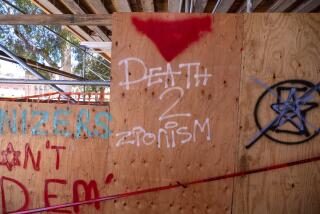The Kahane Effect
- Share via
Rabbi Meir Kahane is candid about what he thinks. The American-born founder of the Jewish Defense League who has become a figure of increasing political importance in Israel believes and proclaims that democracy and Zionism are utterly incompatible. To preserve Zionism, Kahane says, democratic safeguards must be discarded and along with them standards of decent political behavior. Specifically, Kahane would create an Arab-free Greater Israel by expelling all the Palestinians living in the territories occupied by Israel since the 1967 war, and the 800,000 Israeli Arabs who are one-fifth of the nation’s citizens.
Four years ago Kahane was elected to parliament as the sole representative of the Kach party. Opinion polls indicate that in the election scheduled for Nov. 1 he would not only be reelected but could see his party’s representation in the Knesset swell to as many as five or even six seats. That chance has now been taken away. In an action supported by Israel’s two major political blocs, the right-wing Likud and the left-center Labor alignment, the High Court of Justice has unanimously upheld the Central Elections Committee’s decision to ban Kahane and other Kach party candidates from the ballot.
The court based its ruling on the compelling claims of national interest. It found that Kach’s extremist political messages threaten the very safety of the state. Kach’s aims and activities are clearly “racist.” Its call for the “systematic and intentional shaming of parts of the population” is “shockingly similar to the horrible examples which the Jewish people have experienced.” Among the things the court must surely have had in mind was Nazi Germany’s infamous 1935 Nuremberg Laws, which stripped Jews of civil rights and outlawed marriage between Jews and “Aryans.” Kahane, in an echo of Nazi viciousness, would outlaw marriage between Jews and Arabs.
A democracy ideally ought to be secure and self-confident enough to permit the expression of even the most odious views, trusting in the collective good sense of the people to reject the siren songs of extremism. The real-life political world is hardly ideal, however. Kahane stands quite simply for the destruction of Israel’s democracy; that fact permitted a respectable case to be made for banning him from elective office. But removing Kahane and his followers from the ballot won’t wipe away the constituency to which he appeals. If right-wing extremists can’t vote for Kach they will almost certainly vote for one of several other extremist parties. There is a strong prospect that the right-wing Likud would try to reach agreement with one or more of these fringe parties to form a governing coalition.
There is no doubt that Kahane’s message has found more receptive listeners as the Arab uprising that began in the occupied territories last December has gone on. Israel’s inability to stamp out the rebellion has fueled frustration and boosted popular tolerance for heavy-handed repressive measures. The fact seems to be that no one in Israel has any practical ideas for bringing things back under control, other than an increasing use of force. And so the world watches as an advanced technological society that once commanded respect for its humane values resorts to the primitive brutalities of a Third-World police state--bone-breaking, collective punishments, in one notably bizarre episode even snatching the corpse away from a funeral procession in an effort to stop a demonstration. It is against this background that Israelis are preparing to vote. Kahane won’t be on the ballot. But the chilling possibility occurs that the ideas he stands for may nonetheless be gaining support.
More to Read
Sign up for Essential California
The most important California stories and recommendations in your inbox every morning.
You may occasionally receive promotional content from the Los Angeles Times.









